|
|
|
Sort Order |
|
|
|
Items / Page
|
|
|
|
|
|
|
| Srl | Item |
| 1 |
ID:
092497
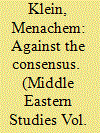

|
|
|
|
|
| Publication |
2009.
|
| Summary/Abstract |
Despite its dogmatic image, Hamas has a tradition of debate in its ranks. It is shown below through critical articles and manifestos composed in the years 1993-2007 by senior members of the movement. The common denominator among all these documents is their critique of the consensus in Hamas. Oriented pragmatically rather than theologically, the writers cover Hamas' most important issues and are diverse in their styles and structures. By analyzing these documents we can peer into Hamas' 'political-ideological kitchen'.
|
|
|
|
|
|
|
|
|
|
|
|
|
|
|
|
| 2 |
ID:
158635
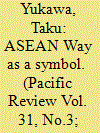

|
|
|
|
|
| Summary/Abstract |
Has the ‘ASEAN Way’ – a set of rules of the Association of Southeast Asian Nations (ASEAN) centered on the principle of non-interference and consensus decision-making – really established its position as an ASEAN norm? This paper aims to analyze the discourses of each ASEAN country and empirically explain their attitudes toward the norm. Specifically, I review various documentations to examine how various ASEAN diplomats have used the term ‘ASEAN Way.’ How did they come to call the principle of non-interference and consensus decision-making ‘ASEAN Way’ in the early 1990s? Why have they begun using the term negatively, as something to be reformed, in recent years? By describing the discourses on the ‘ASEAN Way’ and their changes over the years, I show that the rationality of non-interference and consensus decision-making has changed over time and shifted the positioning of the ‘ASEAN way’ as a symbol. This presents a new and empirical interpretation of the changes in ASEAN Norms.
|
|
|
|
|
|
|
|
|
|
|
|
|
|
|
|
| 3 |
ID:
080875
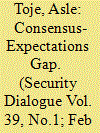

|
|
|
|
|
| Publication |
2008.
|
| Summary/Abstract |
By 2008, what is commonly known as the EU's `capability-expectations gap' has narrowed considerably. While the EU has made notable improvements in terms of its resource availability, as well as the instruments at its disposal, a gap between what the EU member-states are expected to do in the world and what they are actually able to agree upon persists. This article argues that the primary reason why the European Union is unable to deliver the foreign and security policies expected is a lack of decisionmaking procedures capable of overcoming dissent. Repeated attempts to surmount the drawbacks of consensus policymaking have only marginally improved the consistency and effectiveness of the Common Foreign and Security Policy (CFSP). These efforts are assessed by applying consensus as a `conceptual lens' through which to select and assess information. The real-world impact of the lack of cohesiveness, the capacity to make assertive collective decisions and stick to them, is illustrated by Europe's handling of the crisis in the Sudanese province of Darfur in the period 2003-08. The main finding of the article is that as long as the consensus-expectations gap exists, the EU is likely to remain a partial and inconsistent foreign policy actor.
|
|
|
|
|
|
|
|
|
|
|
|
|
|
|
|
| 4 |
ID:
145049
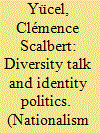

|
|
|
|
|
| Summary/Abstract |
Many concepts and notions have been used to deal with the social and political fact of difference, and diversity is the last on the list, as stated by Avana Lentin and Gavan Titley. It has been described by many as vague, ubiquitous and malleable, ambiguous, or else multifaceted. Most of the authors who have dealt critically with the topic have stressed the plasticity and ubiquity of diversity, considered at times as discourse, at others as practice or policy, and sometimes as both. But among these authors, there are numerous who have depicted the genealogy or the invention of diversity—therefore, breaking the vicious circle of the vision of a vague and ungraspable diversity.
|
|
|
|
|
|
|
|
|
|
|
|
|
|
|
|
| 5 |
ID:
088478
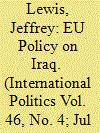

|
|
|
|
|
| Publication |
2009.
|
| Summary/Abstract |
At first glance, Europe's discord over the US-led invasion of Iraq in 2003 was a foreign policy debacle. And when a majority of Member States publicly broke ranks with a tenuously reached common position, skeptics argued that the EU's consultative and consensus-based process of foreign policy making was either fictitious or irrevocably broken. But in fact, the Iraq crisis triggered a normative reframing of security and defense policy and renewed a commitment to consensus decision making. Rather than a lowest common denominator outcome, a compromise position was reached in the form of EU-coordinated economic and humanitarian assistance to rebuilding Iraq that has exceeded 200 million euros per year since 2004. This was possible because normative commitments to develop the EU as a global actor and to promote democracy and the rule of law worldwide legitimated EU action and constrained Member States with 'do nothing' and/or 'let the UN do it' preferences. The foreign ministers' ability to reach agreement on coordinated recon aid to Iraq also displays the Union's principled commitment to make decisions in a norm-governed and consensus-based institutional environment of cooperative bargaining.
|
|
|
|
|
|
|
|
|
|
|
|
|
|
|
|
| 6 |
ID:
086400
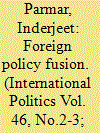

|
|
|
|
|
| Publication |
2009.
|
| Summary/Abstract |
Several tendencies in US foreign policy politics generated a new foreign policy consensus set to outlast the Bush administration. Three developments are analysed: increasing influence of conservative organizations - such as the Heritage Foundation, and of neoconservatism; and, particularly, democratic peace theory-inspired liberal interventionism. 9-11 fused those three developments, though each tendency retained its 'sphere of action': Right and Left appear to have forged an historically effective ideology of global intervention, an enduring new configuration of power. This paper analyses a key liberal interventionists' initiative - the Princeton Project on National Security - that sits at the heart of thinking among centrists, liberal and conservative alike. This paper also assesses the efficacy of the new consensus by exploring the foreign policy positions and advisers of President-elect Barack Obama and his defeated Republican rival, Senator John McCain, concluding that the new president is unlikely significantly to change US foreign policy.
|
|
|
|
|
|
|
|
|
|
|
|
|
|
|
|
| 7 |
ID:
154551
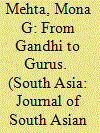

|
|
|
|
|
| Summary/Abstract |
This article compares the public sphere of gurus (‘guru-sphere’) in contemporary Gujarat and that of Gandhi historically as important sites of political contestation. It argues that despite their common use of religious idioms to convey political ideas, Gandhi and the gurus authorise radically different political projects with divergent conceptions of the Hindu subject and Indian polity. The discursive activities of the guru-sphere have helped forge a dominant consensus that endorses Hindutva politics. Operating within a democratic civil society and borrowing from Gandhian idioms, gurus have actively challenged key constitutional values derived from the Gandhian public sphere. The study reveals the paradoxical tendency of Gujarat's public sphere to produce hegemonic monologues over pluralistic dialogues, not in the absence of, but through the institutional mechanisms of, deliberative democracy.
|
|
|
|
|
|
|
|
|
|
|
|
|
|
|
|
| 8 |
ID:
090025
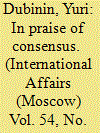

|
|
|
|
|
| Publication |
2008.
|
| Summary/Abstract |
What is consensus? This is one of the methods of making decisions at multilateral forums. In order to be approved by consensus, a decision should be supported by all, or at least not raise objections among any participants in the forum. This is its fundamental difference from the other methods, like the method of making decisions based on majority of votes.
|
|
|
|
|
|
|
|
|
|
|
|
|
|
|
|
| 9 |
ID:
181380
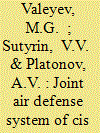

|
|
|
|
|
| Summary/Abstract |
This paper offers the results of research into trends in the use of results-based management methods to justify measures for adjusting the joint air defense (AD) system of CIS member states to the task of solving aerospace defense problems.
|
|
|
|
|
|
|
|
|
|
|
|
|
|
|
|
| 10 |
ID:
175356
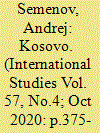

|
|
|
|
|
| Summary/Abstract |
The present tensions in Belgrade–Pristina relations highlight the relevance of a consensus regarding the question of Kosovo. This article argues that the cyclical nature of Kosovo’s history has been muted by the thesis ‘Kosovo is a unique case’ which through unilateral decisions produced various legal schizophrenias. These legal schizophrenias embodied in a power triangle—Ahtisaari Plan–European Union Rule of Law Mission in Kosovo (EULEX)–Kosovo’s Constitution. Despite gaps and inherited chaos, the indisputable achievements of the EU’s efforts in normalizing relations between Belgrade and Pristina show that the EU not only can facilitate peace but also possesses the capacity to achieve a consensus. Already there is a ‘silent’ consensus among actors on the status of Kosovo—the European protectorate. The article also discusses institutional design based on the consensus, which aims to promote shared narratives.
|
|
|
|
|
|
|
|
|
|
|
|
|
|
|
|
| 11 |
ID:
117070
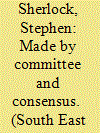

|
|
|
|
|
| Publication |
2012.
|
| Summary/Abstract |
The study of political parties in the parliamentary arena in Indonesia is in its infancy. This has led to various assumptions about the way parties act in the House of People's Representatives (Dewan Perwakilan Rakyat, or DPR) that are based on scanty evidence and are heavily influenced by hostile attitudes to the DPR common in the media and the NGO community. The paper argues that, contrary to assertions that central party leaders exercise strict discipline over their members in parliament, coordination between party and caucuses, or fraksi, is weak, inconsistent and ad hoc. The paper concludes that this situation is facilitated by the eschewing of public votes through the process of decision making by 'consensus', a practice that is actually a vote by fraksi leaders to the exclusion of ordinary members.
|
|
|
|
|
|
|
|
|
|
|
|
|
|
|
|
| 12 |
ID:
140008
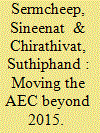

|
|
|
|
|
| Summary/Abstract |
The ASEAN Economic Community (AEC) is Thailand’s current priority and the AEC Blueprint is being progressively implemented in the country. However, different domestic economic interests have contributed to the slow pace of implementation. Three case studies — the agricultural sector, the logistics industry, and the mobility of medical professionals — are used to illustrate this. To move the AEC beyond 2015 and to enhance consensus-building during the community-building process, this paper puts forth the following policy recommendations: (i) the Thai government should enhance awareness of the community-building process and convey more details about the AEC to stakeholders and the general public; (ii) closer consultation and more integrated relationships between the government and stakeholders should be fostered; (iii) the government should formulate policies to improve the competitiveness of the affected stakeholders and industries to reduce the adverse impact from the AEC.
|
|
|
|
|
|
|
|
|
|
|
|
|
|
|
|
| 13 |
ID:
084589
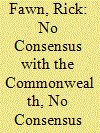

|
|
|
|
|
| Publication |
2008.
|
| Summary/Abstract |
Prime Minister Jean Chr tien considered his decision to keep Canada out of the Iraq War of 2003 as the best of his tenure. That move challenges the previous record of Canada's participation in war with the two Commonwealth countries to which it is most often compared, Australia and the United Kingdom; it was also an apparent departure in relations with the United States. This article, in its first section, argues that the 'decision' was belated and incoherent, and also, relatedly, one that lacked sufficient grounding in Canadian foreign policy traditions. The article hypothesizes in its second section on foreign policy options, arguing further that the Canadian government was unconstrained by expectations of the United States but also that it could have made an essentially cost-free decision, and one tied into a defensible interpretation of Canadian foreign policy traditions.
|
|
|
|
|
|
|
|
|
|
|
|
|
|
|
|
| 14 |
ID:
109940


|
|
|
|
|
| Publication |
2012.
|
| Summary/Abstract |
Habermas's paradigm of communicative action is usually taken to be pretty much dominated by consensus, "Yes-saying." What if this were a radically one-sided perception? We take up this unorthodox position by arguing that "no-saying" in this paradigm is typically overlooked and underemphasized. To demonstrate this, we consider how negativity is figured at the most basic onto-ethical level in communicative action, as well as expressed in civil disobedience, a phenomenon to which Habermas assigns the remarkable role of "touchstone" (Prufstein) of constitutional democracy. Once the importance of no-saying is drawn out, the paradigm looks distinctly less hostile to dissensus and agonism in democratic life.
|
|
|
|
|
|
|
|
|
|
|
|
|
|
|
|
| 15 |
ID:
181879
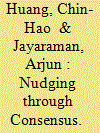

|
|
|
|
|
| Summary/Abstract |
With its emphasis on organizational minimalism, how does ASEAN induce change in its members’ policies? This paper examines the impact of consensus within ASEAN on haze mitigation in the Indonesian archipelago. When ASEAN articulates its environmental initiatives with a strong consensus, this clarity in its norms incentivizes emulation. The stronger the consensus within the group, the more compelling it becomes for members to adopt the agreement. Such prosocial behavior reflects nudging. Strong ASEAN consensus is a precursor of nudging that leads to dimmer hotspots. This study draws on discourse analysis of ASEAN summit statements on the haze, R programming to analyze NASA data on the brightness of peatland hotspots, and a case study to illustrate the causal mechanism. The findings identify ASEAN’s role in environmental governance, particularly with respect to when consensus-based nudging is more or less likely to incentivize member states to curb transboundary haze.
|
|
|
|
|
|
|
|
|
|
|
|
|
|
|
|
| 16 |
ID:
163762
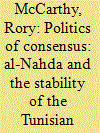

|
|
|
|
|
| Summary/Abstract |
Tunisia&s transition away from authoritarianism has been shaped by a politics of consensus, which has brought together representatives of the former regime with their historic adversary, the Islamist movement al-Nahda. This article argues that consensus politics was a legacy of the authoritarian regime that was re-produced during a democratizing transition. The politics of consensus was encouraged and enabled by al-Nahda, which prioritized its inclusion within this elite settlement to provide political security for itself and the broader transition. However, this came at a cost, engineering a conservative transition, which did not pursue significant social or economic reform. The Tunisian case shows that historical legacies, such as consensus politics, can shape a transition as much as contingent, pragmatic decisions by political leaders.
|
|
|
|
|
|
|
|
|
|
|
|
|
|
|
|
| 17 |
ID:
112874
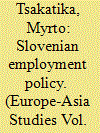

|
|
|
|
|
| Publication |
2012.
|
| Summary/Abstract |
Slovenian employment policy was subject to 'soft' Europeanisation despite the lack of normative resonance between entrenched policy ideas and new policy ideas embedded in the European Union's Employment Strategy. The key mechanisms at work are shown to be voluntary policy transfer and diffusion, rather than strategic use of Europe by key domestic actors to bring about policy change. This article argues that normative resonance is not a necessary condition for 'soft' Europeanisation and highlights the importance of other domestic factors, such as norms of consensus-seeking and relative independence from international financial capital as mediating factors that can explain policy impact.
|
|
|
|
|
|
|
|
|
|
|
|
|
|
|
|
| 18 |
ID:
095954
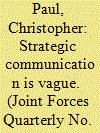

|
|
|
|
|
|
|
|